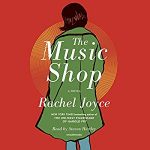A Book That’s Music to the Ears
 The book group I facilitate at a senior center was humming with excitement at our recent meeting. Our book was The Music Shop by Rachel Joyce, and all ten readers loved it.
The book group I facilitate at a senior center was humming with excitement at our recent meeting. Our book was The Music Shop by Rachel Joyce, and all ten readers loved it.
We’ve had plenty of lively meetings at which some members expound, politely of course, on why a book isn’t at all good and others on why it’s stunningly beautiful. The only dissension this time was over which character was the most interesting, which scene the most beautiful, or which description of music the most memorable. There were many to choose from.
In every chapter Joyce names at least one composer, composition, singer, or songwriter. I counted about 80 total in the book, ranging from Pérotin’s Beata Viscera of the 13th century to Michael Jackson’s Bad of 1987, the year before most of the book’s action takes place. The Music Shop is a warm appreciation of music of all styles.
The book tells the story of Frank, the shop’s owner, “a gentle bear of a man” who believes in the healing power of music. His store is small and cluttered. There’s no name on the door, just a handmade sign that states, “for the music you need!!! everyone welcome!! we only sell VINYL!” CDs, which had overtaken vinyl records in popularity in 1988, were, in Frank’s mind, toys. Though vinyl records had their shortcomings, part of their beauty was that they had to be treated carefully. “We are acknowledging the importance of music and beauty in our lives,” he tells a CD salesman. “You don’t get that if you’re not prepared to make an effort.”
Frank has a quirky coterie of devoted followers — customers, neighboring shopkeepers, and staff. They all appreciate his attention and his uncanny ability to find the music they need, which isn’t the same as what they request. He finds the song to ease a broken heart, a flagging spirit, or a strained marriage.
 When the man who listens only to Chopin enters the shop, he persuades him to go into the listening booth (converted from a Victorian wardrobe) with a recording of Aretha Franklin’s Spirit in the Dark. “I know it’s not what you want, but trust me, today’s it’s what you need.” And he’s right. [p. 12]
When the man who listens only to Chopin enters the shop, he persuades him to go into the listening booth (converted from a Victorian wardrobe) with a recording of Aretha Franklin’s Spirit in the Dark. “I know it’s not what you want, but trust me, today’s it’s what you need.” And he’s right. [p. 12]
He gives his bank manager Waltz for Debby by Bill Evans, the canticles of Hildegard von Bingen, and
“Wild Thing” by the Troggs. The last, he explains, is a “lullaby” for his baby who doesn’t sleep through the night. (I clicked on YouTube more than once to hear the tunes Frank suggested.)
Frank’s comfortable and carefully circumscribed life is jolted turn when Ilse, a German woman in a green coat, faints at the doorway to his shop. Who is she? Why did she faint? All anyone knows is what she said: “I was just passing.”
Ilse returns again and again. At her request, Frank begins to teach her about music. He gives her Pérotin’s Beata viscera (“It’s just a single human voice but it feels like stepping onto a bird’s back. … It takes you up, it swoops you down, and then it lifts you so high you’re a pinprick in the sky.”); Tosca by Puccini (“This is a big love story. … It’s not a ride to heaven … the big showdown between God and man”); James Brown’s “Ain’t It Funky Now” (“This one’s about groove. The beat repeats and repeats and repeats….It’s a sock in the jaw.”); and Led Zeppelin’s “Stairway to Heaven” (This one kind of unravels in layers…. It’s big, and it knows it’s big, but you’re only allowed to have it piece by piece.”)
It seems obvious to everyone but Frank that love is in the air. He, this man who locates curative music for everyone else, is unable to help himself. He’s too bruised and too scared. Ilse, too, suffered hurt and disappointments, which Joyce in time reveals to the readers. She slowly faces her demons, but Frank’s seem insurmountable.
Music can bring joy or sorrow. It can lift you up, take you down, and lift you even further. Joyce does lift us further but only after some surprising intervals.
They proved satisfying to everyone in my group, and I think you will be too.
Janet Willen
Janet Willen is author of Speak a Word for Freedom: Women against Slavery (2015) and Five Thousand Years of Slavery (2011), written with Marjorie Gann and published by Tundra Books. Publishers Weekly called Speak a Word for Freedom an “engrossing study of female abolitionists from the 18th century to the present day” and gave the book a starred review. Five Thousand Years of Slavery was named a 2012 Notable Book for a Global Society by the International Reading Association and a Silver Winner in young adult nonfiction of ForeWord Reviews, and it received a starred review from School Library Journal. A writer and editor for more than thirty years, Janet has written many magazine articles and has edited books for elementary school children as well as academic texts and a remedial writing curriculum for postsecondary students. Janet lives in Silver Spring, Maryland.